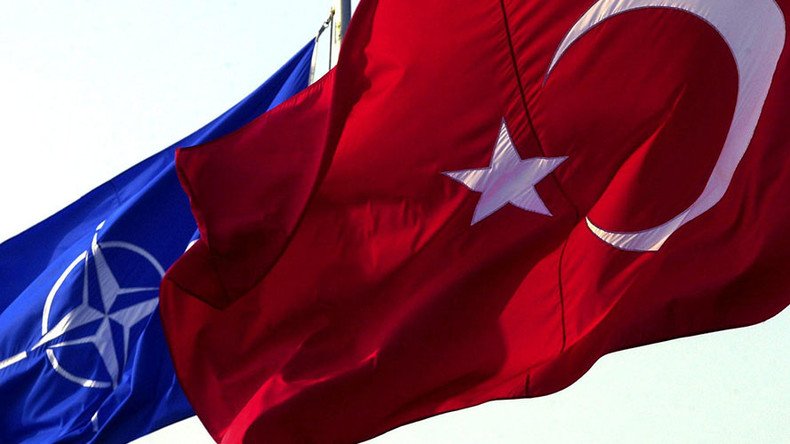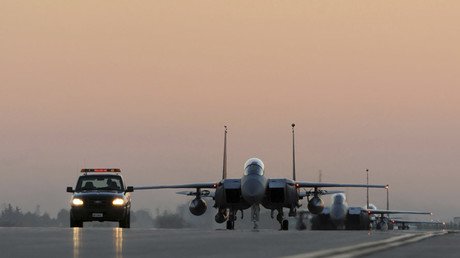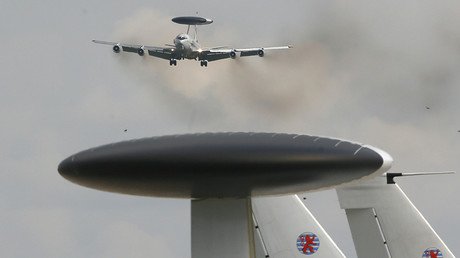Pro-Erdogan MP slams NATO as ‘terrorist organization’ & ‘threat’ to Turkey

An MP from Turkey’s ruling Justice and Development party (AKP) has questioned NATO’s commitment to its key ally, claiming that the bloc has been backing regime change attempts in Ankara and supports “terrorist groups” in the region.
Şamil Tayyar, who represents Turkey’s southeast Gazientep province, launched a scathing verbal attack on the military alliance in an interview to Milat daily on Monday, claiming that since Turkey joining the alliance in the 1950s, it has played a negative role in Turkish history.
“NATO has always been in charge of the dirty and bloody deeds in the country. The 1960 military coup was staged by the British, the 1971 coup was staged by the CIA, and the 1980 coup was staged by NATO,” Tayyar said, as cited by Hurriyet.
The MP argued that in NATO’s vision for the future, there would be no place for current Turkish president and AKP party leader Recep Tayyip Erdogan.
Far from being a partner, NATO “has become a threat and is spreading terror organizations across the region,” Tayyar claimed, adding that it should be treated on a par with other Turkish adversaries designated as terrorist groups by Ankara, such as Islamic State [IS, formerly ISIS, ISIL], the Kurdistan Workers’ Party, as well as the Hizmet movement led by exiled cleric Fethullah Gulen, which the Turkish authorities label as FETÖ (Fethullahist Terror Organization).
READ MORE: Turkey: Settlement of Syrian conflict without Assad ‘not realistic’
While admitting there is a glimmer of hope that the situation will change for the better under the Trump administration, Tayyar said Turkey should be ready to scale down its cooperation with the alliance, in particular, to close the Incirlik Air Base used by US-led coalition warplanes if Washington fails to greenlight Gulen’s long-sought extradition to Turkey and withdraw support from “terror organizations in Syria.”
Relations between Washington and Ankara have soured in the aftermath of the failed coup attempt in July 2016. As the coup plot was unraveling, Ankara imposed a temporary no-fly order on coalition flights out of the Incirlik air base out of suspicion it could be used by plotters. A senior Turkish commander of the airbase, which is used jointly by US and NATO forces, along with dozens of lower ranking officers, was later charged with complicity in the coup. This and Washington’s reluctance to hand over Gulen to Turkey immediately as requested by Ankara have added fuel to speculation in the Turkish media that the US could have some interest in overthrowing Erdogan.
READ MORE: Former NATO commander ‘behind failed coup against Erdogan’ – Turkish daily
The claims were vehemently denied by Washington.
Lately, the calls for shutting the air base to the US-led coalition fighting ISIS in Syria have been coming from within senior ranks of the Turkish government, which blamed it for not providing enough support to the Turkish troops and opting to help Kurdish militias, whom Ankara consider terrorists.
“Our people ask, why are they using the Incirlik Airbase. We allowed not only the US but also other countries’ jets to use Incirlik to jointly fight [Islamic State]. What purpose are you serving if you do not provide aerial support against Daesh [Islamic State] in the most sensitive operation for us?” Turkish Foreign Minister Mevlut Cavusoglu said in early January, citing a widening “confidence crisis” between the US and Turkey.
Tayyar questioned whether it is worth Ankara staying in NATO, arguing that “it has turned into a structure threatening Turkey, rather than protecting it.”
“NATO exists as a product of the Cold War era,” he said.
NATO stood firmly behind Ankara at the height of the Russian-Turkish row over the downing of a Russian Su-24 bomber over Syria in November 2015.
“We have repeatedly made clear, we stand in solidarity with Turkey and support the territorial integrity of our NATO Ally, Turkey,” NATO Secretary General Jens Stoltenberg said following an incident, backing Turkey’s version of the events.
NATO also boosted Turkey’s air defense capabilities in the weeks following the incident with interceptor aircrafts, radar planes and ships.














